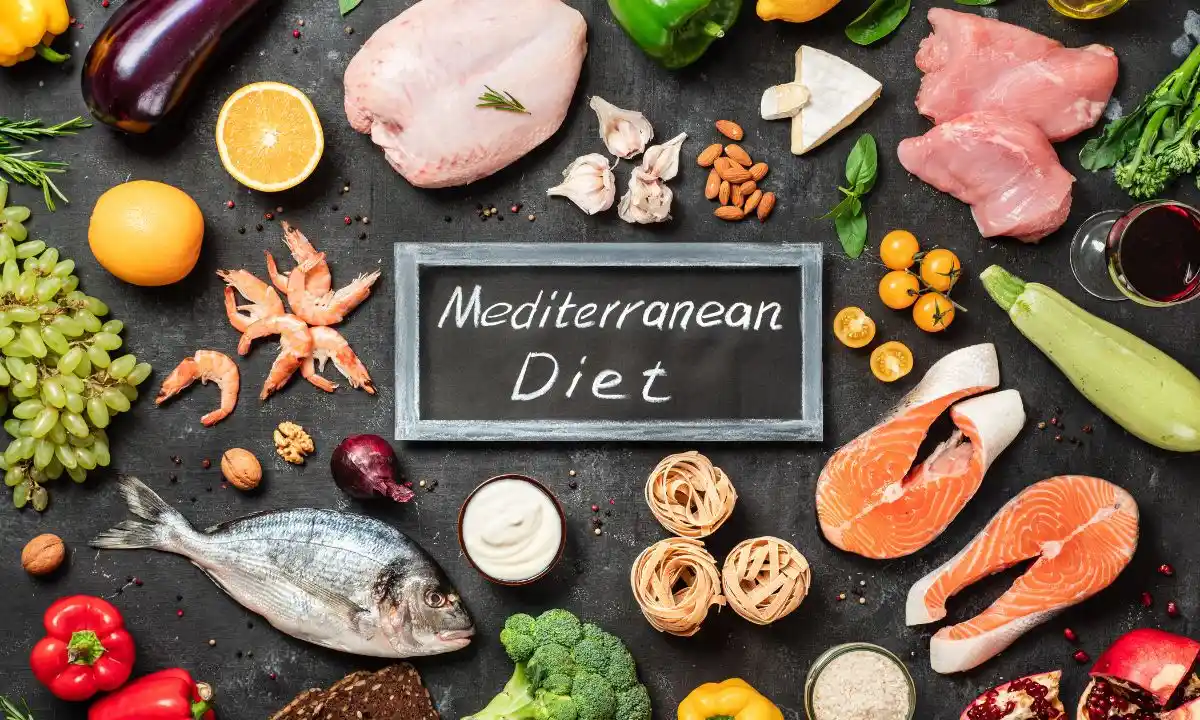Share on social media

Mediterranean Diet vs Other Diets— the choice can feel overwhelming when social feeds overflow with quick‑fix promises and conflicting nutrition advice. Each year, millions test one plan after another, hoping for lasting results that won’t compromise their quality of life.
You don’t have to navigate this confusion alone. The U.S. News & World Report’s annual Best Diets rankings provide evidence-based guidance by evaluating 30 diets across 21 health categories. For 2024, their panel of 69 medical experts – including doctors, registered dietitians, and epidemiologists – has once again named a clear winner in the mediterranean diet vs other diets debate.
The mediterranean diet has held the #1 overall spot for 7 years running with a 4.8 overall score. But how does this ancient eating style compare to trendy options like Keto, intermittent fasting, or commercial programs like Weight Watchers? Let’s take a look at what the research suggests about the most effective approaches to healthy eating and sustainable weight loss.
The 2024 diet rankings reveal several vital takeaways for anyone looking for a healthy diet:
The expert evaluation involved a rigorous analysis across categories, including heart disease prevention, diabetes management, ease of following, and nutritional completeness. This helps separate marketing hype from science-backed diets.
The standard Mediterranean diet is based on traditional eating patterns found in Mediterranean countries bordering the Mediterranean Sea. This eating style emphasizes fresh fruits and vegetables, whole grain bread, olive oil as the primary fat source, nuts, legumes, and moderate amounts of fish and seafood.
The Mediterranean lifestyle includes dairy products, such as low-fat cheese and feta cheese, in moderation. Red meat and processed meats are limited to occasional consumption. Unlike restrictive fad diets, this approach doesn’t exclude meat entirely but treats fatty or processed meats as rare indulgences rather than daily staples.
The Mediterranean diet’s dominance is clear when examining specific health categories. Beyond its overall score of 4.8, it scored 4.7 for diabetes management, 4.7 for reducing inflammation, and 4.6 for mental health support. These scores reflect extensive research indicating a reduced risk of cardiovascular disease, certain types of cancer, and cognitive decline.
A 2023 systematic review published in BMJ analyzed data from 35,000 patients and found the mediterranean diet reduced all-cause mortality, heart attacks, and stroke rates compared to other heart-healthy eating plans. The American Heart Association has endorsed this eating pattern for its cardiovascular benefits.
Research consistently links mediterranean eating patterns to better brain health outcomes. The diet’s rich supply of healthy fats, derived from olive oil and nuts, combined with antioxidants from fresh fruits and vegetables, appears to protect against cognitive decline and reduce the risk of dementia.
Studies show people following a Mediterranean-style diet have slower rates of brain aging and better memory function as they age. While individual results vary, the broad range of neuroprotective compounds in plant-based foods provides multiple pathways for brain protection.
Unlike restrictive eating plans that require calorie counting or eliminate entire food groups, the mediterranean diet is remarkably flexible. This eating style adapts to different cultures and personal preferences while maintaining its core principles of minimally processed whole foods.
The lack of hard and fast rules regarding portion sizes or forbidden foods makes this approach sustainable in the long term. People can enjoy social meals, accommodate family preferences, and even include moderate wine consumption while following mediterranean principles.

DASH (Dietary Approaches to Stop Hypertension) was designed to combat high blood pressure through a balanced diet. This eating plan emphasizes a dramatic reduction in sodium intake – ideally 1,500-2,300 mg daily – while increasing consumption of nutrients that help lower blood pressure. The Dash diet includes more lean meat and dairy products than Mediterranean approaches, but both eating styles prioritize fruits, vegetables, whole grains, and minimal processed foods. This makes DASH appealing to those who want to increase their protein intake while managing cardiovascular risk factors.
The 2024 rankings gave DASH a perfect 4.9 score for blood pressure management, the highest rating in any category. Multiple randomized controlled trials have shown that the DASH diet can lower both systolic and diastolic blood pressure within weeks of starting.
Health experts recommend the DASH diet for patients with hypertension because it addresses the condition through multiple mechanisms, including reduced sodium intake, increased potassium from fruits and vegetables, and improved overall diet quality. Many people see blood pressure improvements before significant weight loss occurs.
Unlike many popular diets that lack medical backing, the DASH diet has widespread support from healthcare providers. Registered dietitians often recommend this eating plan because it’s evidence-based and doesn’t require expensive supplements or specialty foods.
The diet’s focus on everyday foods makes it accessible to most people regardless of budget constraints. This practical approach leads to better long-term adherence than more restrictive alternatives.
Weight Watchers (WW) scored 4.3 for short-term weight loss, beating the mediterranean diet. WW’s success stems from its comprehensive support system, which combines point-based food tracking, group meetings, and behavioral coaching.
The program’s strength lies in accountability and community support rather than revolutionary nutrition science. Members learn to make healthier choices within a structured framework that doesn’t completely eliminate favorite foods, making it more sustainable than extreme restriction approaches.
While WW is great for initial weight loss, research suggests the mediterranean diet may be better for long-term weight maintenance. Studies show people lose weight gradually on mediterranean eating plans and maintain those losses more successfully over multiple years.
The key difference is approach: WW requires ongoing membership and point tracking, while mediterranean eating becomes a natural lifestyle change. People following Mediterranean principles report higher satisfaction and a lesser feeling of deprivation, contributing to sustainable results.
Noom’s Technology Integration is a newer approach to weight management, combining nutrition education with cognitive behavioral therapy through mobile app technology. It scored well for changing underlying eating behaviors rather than just restricting calories.
The app-based format appeals to tech-savvy users who prefer self-directed learning over group meetings. However, long-term data on Noom’s effectiveness are limited compared to more established approaches, such as the Mediterranean diet.
The Keto diet is #1 for fast weight loss but #25 overall. This vast difference highlights the distinction between short-term results and long-term health outcomes.
Keto achieves rapid initial weight loss by putting the body into a state of ketosis, where it burns fat for energy instead of carbohydrates. This requires eliminating most fruits, all grains, legumes, and starchy vegetables—a level of restriction that’s unsustainable for most people long term.
Health experts rank Keto low for ease of following and nutritional completeness. The diet’s elimination of entire food groups creates social challenges, limits restaurant options, and requires extensive meal planning to avoid nutrient deficiencies.
Many people experience side effects, including fatigue, constipation, and difficulty concentrating, during the adaptation phase. While these often improve the restrictive nature, they make it hard to maintain ketosis consistently, leading to cycles of weight loss and weight gain.
Atkins shares many of Keto’s limitations, ranking #26 overall despite promises of rapid weight loss. Both diets severely restrict carbohydrates, resulting in quick initial results that rarely translate into lasting lifestyle changes.
The high intake of saturated fats from animal products raises concerns about long-term cardiovascular health, particularly when compared to the heart-healthy effects of mediterranean eating patterns. Most registered dietitians express reservations about recommending these approaches for extended periods.
Popular diets like Keto and Paleo benefit from aggressive marketing that emphasizes dramatic before-and-after photos while downplaying sustainability challenges. Social media amplifies these messages, creating unrealistic expectations about what constitutes healthy eating.
The reality is that restrictive eating plans may work for some people temporarily, but they don’t address the underlying habits and preferences that determine long-term success. This is why evidence-based approaches, such as the Mediterranean diet, consistently outperform trendy alternatives in expert evaluations.
MIND Diet: Cognitive Protection. The MIND diet is an innovative hybrid approach that combines Mediterranean and DASH principles for brain health. This eating plan scored 4.7 for cognitive benefits by emphasizing foods with the strongest evidence for neuroprotection.
Core MIND diet recommendations include daily servings of leafy green vegetables, weekly portions of berries (especially blueberries), nuts, olive oil, and fish, while limiting red meat, butter, cheese, and refined carbohydrates. This targeted approach appeals to people concerned about cognitive decline and Alzheimer’s risk.
Research on the effectiveness of the MIND diet shows promising but mixed results. Some epidemiological studies suggest adherents have slower cognitive decline, but clinical trials haven’t proven prevention benefits. More research is needed to establish firm recommendations.
The flexitarian diet scored top in the plant-based category with a 4.6, offering a middle ground between entirely plant-based diets and conventional eating patterns. This approach emphasizes plant-based foods while allowing occasional meat consumption.
Flexitarian eating appeals to individuals who want the health benefits of increased plant consumption without eliminating animal products. It’s easier to follow than strict vegan approaches while still providing significant health and environmental benefits.
The flexibility makes this eating style particularly sustainable for families and social situations where dietary restrictions can be challenging. Most people can adopt flexitarian principles gradually, making it an excellent stepping stone to healthier eating.
The 2024 rankings feature diets tailored to specific health conditions, reflecting the growing interest in therapeutic nutrition. The Low-FODMAP diet scored 4.8 for IBS management, demonstrating the effectiveness of targeted approaches for particular conditions.
Other condition-specific options include gluten-free eating plans for celiac disease, anti-inflammatory diets for autoimmune conditions, and specialized approaches for acid reflux management. These diets require professional guidance to ensure nutritional adequacy while managing symptoms.
Thirteen new diets entered the 2024 rankings, including menopause specific eating plans and various gut health approaches. While some show promise for specific populations, health experts caution that newer approaches lack long-term safety data.
The proliferation of specialized diets reflects both the advancement of nutrition science and marketing-driven trends. Consumers should prioritize approaches with substantial research backing over those promising revolutionary results based on limited evidence.

Panel Composition US News & World Report rankings are based on a panel of 69 experts from multiple healthcare disciplines. This group includes medical doctors specializing in cardiology and endocrinology, registered dietitians with clinical experience, epidemiologists who study population health trends, and nutrition researchers from top academic institutions.
This multidisciplinary approach ensures that diet evaluations consider both clinical effectiveness and real-world implementation challenges. The panel’s expertise spans various areas of health, providing balanced perspectives on the strengths and limitations of each diet.
Each diet is evaluated across 21 health categories using a 5-point scale. Categories include short-term and long-term weight loss, cardiovascular disease prevention, diabetes management, brain health support, nutritional completeness, safety, and ease of following.
The scoring system prioritizes peer-reviewed research over anecdotal evidence or marketing claims. Panelists must justify their ratings with scientific literature, ensuring that popular diets are not inflated with scores based solely on media attention.
The evaluation process emphasizes randomized controlled trials and systematic reviews as the gold standard for evidence. Diets with extensive research backing, such as the Mediterranean diet and the DASH diet, score higher than newer approaches with limited data.
This evidence-first approach helps consumers distinguish between scientifically supported eating plans and those riding the popularity wave. The methodology prioritizes long-term health outcomes over short-term results, which is why restrictive diets often rank poorly, despite their initial effectiveness.
The ranking system is updated annually to incorporate new research and address emerging nutrition trends. This ongoing refinement ensures recommendations stay current with the latest scientific understanding of nutrition and health.
The transparent methodology allows healthcare providers and consumers to see exactly how each diet scored. This transparency fosters trust, enabling people to make informed decisions based on their unique health goals and circumstances.
The best diet for anyone is dependent on their health goals and medical conditions. People with high blood pressure may benefit most from the DASH diet’s sodium restrictions; those concerned about cognitive decline might prefer the mind diet’s brain-focused approach.
Weight loss goals also influence the right diet for you. Those needing rapid initial results for health reasons might consider supervised low-carb approaches, while those seeking sustainable long-term weight management do better with mediterranean eating patterns.
Medical Considerations and Professional GuidanceAnyone with health conditions should consult with healthcare providers before making significant dietary changes. Certain medications interact with dietary changes, and some conditions require specific nutritional considerations that standard diets may not address.
Registered dietitians can help tailor eating plans to individual preferences, cultural background, and practical constraints while maintaining nutritional adequacy. Professional guidance significantly improves long-term success rates compared to self-directed diet attempts.
Successful diet adoption requires honest assessment of lifestyle factors, including cooking skills, time availability, family preferences, and budget constraints. The most scientifically sound eating plan will fail if it doesn’t fit into someone’s real-world circumstances.
The Mediterranean diet is flexible and can be adapted to various situations, while more structured approaches, such as Weight Watchers, provide detailed guidance for those who prefer specific instructions. Consider the level of structure that best suits your personality and preferences.
Research indicates that gradual dietary changes are often more sustainable than dramatic overhauls. Starting with small modifications – like switching to olive oil or adding more vegetables – allows taste preferences to adapt naturally while building confidence in cooking new foods.
However, some people respond better to comprehensive changes that create clear boundaries. Knowing your change style helps determine whether to adopt a diet completely or incorporate its principles into your existing eating patterns.
What diet is best for beginners seeking to enhance their overall health?
The Mediterranean diet is ideal for beginners due to its flexibility, emphasis on whole foods, and extensive research backing. Unlike restrictive diets, it doesn’t require eliminating entire food groups or precise calorie counting, making it easier to adopt gradually.
How does the mediterranean diet compare to keto for weight loss?
The keto diet produces faster initial weight loss, but the Mediterranean diet is better for long-term weight maintenance. Keto’s restrictive nature leads to higher dropout rates, while mediterranean eating patterns become enjoyable lifestyle changes that people maintain for years.
Can I combine elements from different top-rated diets?
Yes. Many successful eating plans incorporate principles from multiple approaches. For example, combining mediterranean food choices with DASH sodium guidelines or adding MIND diet brain-healthy foods creates personalized approaches that address individual health goals.
Why do restrictive diets like keto rank lower despite popularity?
Expert panels prioritize long-term health outcomes over short-term results. While restrictive diets produce dramatic initial changes, they score poorly for sustainability, nutritional completeness, and ease of following – factors crucial for lifelong health management.
What makes the Mediterranean diet sustainable in the long term?
The Mediterranean diet’s sustainability stems from its inclusion of all food groups, the enjoyment of foods like olive oil, moderate wine consumption, and flexibility to accommodate social situations and personal preferences. It feels like a lifestyle, not a regimen.
Are expensive specialty diets worth the investment compared to a Mediterranean diet?
Research indicates that there are no significant health benefits associated with expensive specialty programs compared to a Mediterranean-style diet consisting of common, affordable foods. The Mediterranean diet’s effectiveness stems from its food patterns, not from costly supplements or proprietary products.
How often are these diet rankings updated and by whom?
U.S. News & World Report updates its rankings of the best diets annually, incorporating new research and evaluating emerging diet trends. The evaluation involves 69 medical experts who review evidence-based criteria, not popular opinion or marketing influence.
Should I choose a diet based on my specific health conditions?
Yes, certain health conditions require specialized diets. People with diabetes might focus on diets high in blood sugar control, and those with cardiovascular disease should prioritize heart-healthy eating plans. Always consult with healthcare providers for condition-specific guidance.
The evidence overwhelmingly supports a Mediterranean-style diet for most people seeking long-term health improvements and sustainable weight management. Rather than chasing the latest diet trend or falling for marketing promises of quick fixes, focus on proven approaches that health experts consistently recommend year after year.
The mediterranean diet vs other popular diets comparison shows that the most effective eating plan isn’t necessarily the most restrictive or trendy. Instead, success comes from choosing sustainable approaches that emphasize whole foods, provide adequate nutrition, and fit into your individual lifestyle and preferences.
Before making significant dietary changes, consider consulting a registered dietitian who can help you develop a personalized approach tailored to your health goals, medical history, and practical circumstances. Your path to better health doesn’t require perfection – it requires consistency with an eating style you can maintain and enjoy for years to come.
You might like it